US citizens express little hope in govt
Updated: 2014-01-03 08:49
(China Daily/Agencies)
|
||||||||
Nearly 86% call healthcare top priority, but half say progress will not be made
US citizens enter 2014 with a profoundly negative view of their government, expressing little hope that elected officials can or will solve the nation's biggest problems, a new poll finds.
Half say the country's system of democracy needs either "a lot of changes" or a complete overhaul, according to the poll conducted by the AP-NORC Center for Public Affairs Research. Just one in 20 says it works well and needs no changes.
US citizens, who have a reputation for optimism, have a sharply pessimistic take on their government after years of disappointment in Washington.
The percentage of people saying the nation is heading in the right direction hasn't topped 50 in about a decade. In the new poll, 70 percent lack confidence in the government's ability "to make progress on the important problems and issues facing the country in 2014".
The poll comes about two months after partisan gridlock prompted the first government shutdown in 17 years.
People feel somewhat better about their personal lives. Most have at least some confidence that they'll be able to handle their own problems in the coming year. A narrow majority say they'd do a better job running the country than today's leaders in Washington.
Local and state governments inspire more faith than the federal government, according to the poll, with 45 percent at least moderately confident in their state government and 54 percent expressing that much confidence in their local government.
When asked to name up to 10 world or national problems they would "like the government to be working on" in 2014, US citizens chiefly cite issues that have dominated and often flummoxed the White House and Congress for five years.
Health care reform topped the list. It is likely, however, that those naming the issue include both opponents and supporters of President Barack Obama's sweeping health care overhaul.
Jobs and the economy were next, followed by the nation's debt and deficit spending.
Some issues that draw ample media and campaign attention rank lower in the public's priorities. No more than 3 percent of Americans listed gay rights, abortion or domestic spying as prime topics for government action.
Regardless of the issue, however, US citizens express remarkably little confidence that the federal government can make real progress.
For instance, 86 percent of those who called healthcare reform a top priority said they want the government to put "a lot" or "a great deal" of effort into it. But about half of them (49 percent) are "not at all confident" there will be real progress, and 20 percent are only "slightly confident".
This yawning gap between public desires and expectations is one of the poll's most striking findings. Even on an issue completely within the federal government's control - the budget and national debt - 65 percent of those who called it a priority say they have no confidence in the government's ability to fix it. Another 20 percent are only "slightly confident".
When it comes to the issues people cited as most important to them, 80 percent want the government to spend significant effort working on them. Yet 76 percent say they have little or no confidence the government will make real progress.
But asked generally about the role of government in society, the AP-NORC Center poll finds US citizens divided on how active they want government to be. Half say "the less government the better". However, almost as many (48 percent) say "there are more things that government should be doing".
On the economy, an area historically driven by the private sector, the poll finds a clear public desire for active government. Fifty-seven percent of US citizens say "we need a strong government to handle today's complex economic problems".
Even among those who say "the less government the better", 31 percent feel the nation needs a strong government to handle those complex problems.
US citizens don't feel terribly optimistic about their own economic opportunities. Although 49 percent say their standard of living surpasses their parents', most are broadly pessimistic about the opportunity to achieve the American Dream. And they are mixed on whether people like them have a good chance to improve their standard of living.
Few are hopeful that the pieces are in place for the government to improve. About half are pessimistic about the country's ability to produce strong leaders generally. And 61 percent are pessimistic about the system of government overall and the way leaders are chosen.
The poll was conducted online from Dec 12 to 16 among a random national sample of 1,141 adults. The survey has a margin of error plus or minus 3.7 percentage points.
The Associated Press
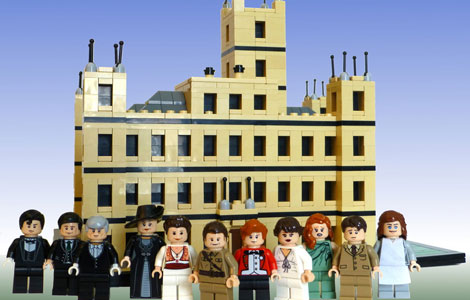
 The Lego version of Downton Abbey
The Lego version of Downton Abbey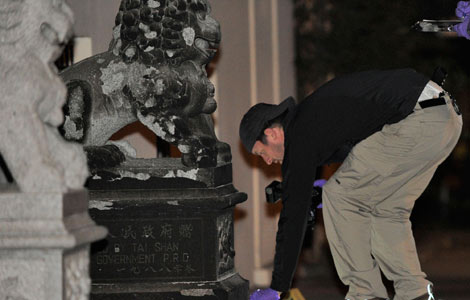
 Police probe fire attack on Chinese consulate
Police probe fire attack on Chinese consulate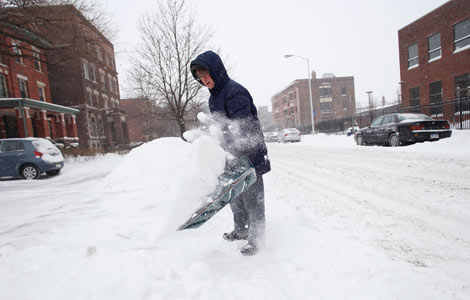
 Powerful storm brings Arctic cold, snow to US
Powerful storm brings Arctic cold, snow to US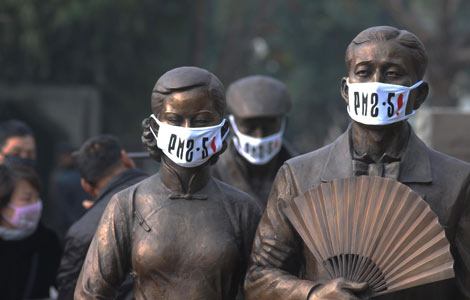
 Beijing sees little improvement in air quality
Beijing sees little improvement in air quality
 125th Rose Parade celebrated in US
125th Rose Parade celebrated in US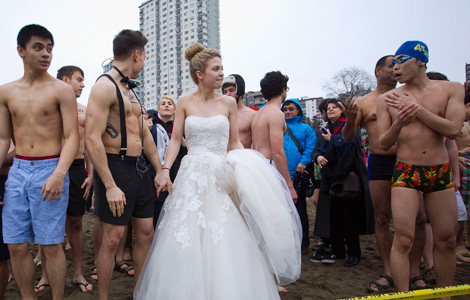
 Cold doesn't dissuade 'Polar Bear Swimmers'
Cold doesn't dissuade 'Polar Bear Swimmers'
 First photos of Liaoning battle group made public
First photos of Liaoning battle group made public
 US First Family out for shave ice in Hawaii
US First Family out for shave ice in Hawaii
Most Viewed
Editor's Picks

|

|

|

|

|

|
Today's Top News
As Obamacare begins, critics launch new assault
FBI: Consulate fire not terrorist act
Smog may affect mental health
New joint command system 'on way'
Chinese helicopter saves 52
US citizens express little hope in govt
China protests US' prisoner transfer
Snowstorm pushes into US Northeast
US Weekly

|

|







